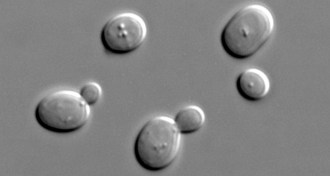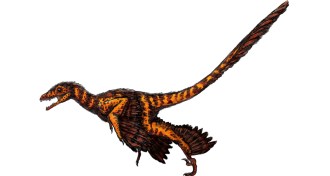Genetics
-
 Genetics
GeneticsYear in review: Life’s complexity recoded
New genetic letters in bacteria and a simplified yeast chromosome showcase scientists' advances in understanding the simplicity and complexity of life.
-
 Life
LifeNew tree of life confirms strange history of birds
A genetic analysis supports some odd groupings in the bird tree of life, showing a lot of convergent evolution in avian history.
By Susan Milius -
 Health & Medicine
Health & MedicineGene variant linked to robust flu vaccine response
Targeting an immune signaling protein called interleukin-28B might boost protection generated by flu shots.
By Nathan Seppa -
 Genetics
GeneticsEarly heart attack tied to rare mutations in two genes
Rare mutations in two genes greatly increase the risk of having a heart attack early in life, a study shows.
-
 Genetics
GeneticsNew type of stem cells, fuzzy and flexible
A new way to make stem cells produces fuzzy cells that appear as flexible as other types of stem cells, but are easier to grow in the lab and avoid ethical issues.
-
 Genetics
GeneticsMale smokers more likely to lose Y chromosomes
Male smokers are more likely to lose Y chromosomes in their blood cells than men who have never smoked or those who have kicked the habit.
-
 Science & Society
Science & Society‘Race Unmasked’ explores science’s racial past, present
Eugenics is far behind us, but a health historian sees few reasons to believe science is postracial.
By Bryan Bello -
 Genetics
GeneticsOrchid genome may save highly endangered species
The sequenced genome of the orchid Phalaenopsis equestris offers some hints about a different form of photosynthesis and how the flowers of the plant got their specialized shape.
-
 Genetics
GeneticsGenes linked to feather development predate dinosaurs
The genes for feather development may have existed more than 100 million years before dinosaurs sported hints of the fluffy plumage.
-
 Genetics
GeneticsRare mutations may protect against heart disease
Rare mutations in a key gene seem to lower bad cholesterol and provide protection against heart disease.
By Nathan Seppa -
 Genetics
GeneticsHuman thoughts control mouse genes
Human brain waves trigger light that activates protein production in rodents.
-
 Genetics
GeneticsGenes tell tale of cat domestication
A peek into cats’ genetic makeup may help reveal how hissing wild felines became purring tabbies.